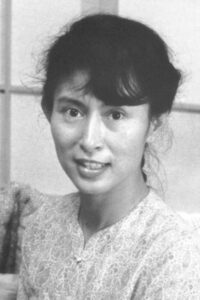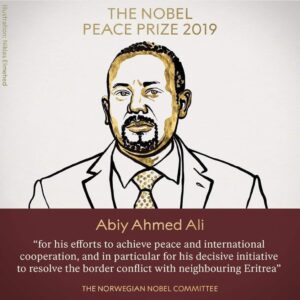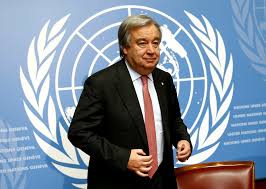Alfred Nobel Howls from the Grave: “Revoke Abiy Ahmed’s Nobel Peace Prize!”
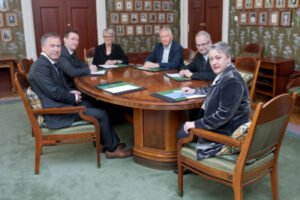 |
| Norwegian Nobel Committee. PHOTO: Nobel Media/Ken Opprann
|
| By Hassan Keynan |
|
The complex and immensely talented Swede, Alfred Nobel, was methodical in the manner he went about doing his business both when he was alive and after his death on 10 December 1896. He left little to chance or speculation.
However, the meticulous inventor and investor was unusually quiet about one specific issue: why he hand-picked a Norwegian Committee and bestowed upon it the privilege of awarding only the Nobel Peace Prize. Even the Norwegian Nobel Committee (NNC) itself expresses astonishment regarding the reason Nobel ‘left no explanation as to why the prize for peace was to be awarded by a Norwegian committee while the other four prizes were to be handled by Swedish committees.” Whatever reasons that led Nobel to pick a Norwegian Committee to be the arbiter of global peace, he would probably never have even contemplated the likes of Aung San Suu Kyi joining the exclusive Nobel Peace Laureates League in 1991. A Nobel Peace Laureate who stands accused of being complicit in the most egregious crime in human history, genocide, would be anathema to Nobel. He must have turned and protested in his grave at least twice recently. 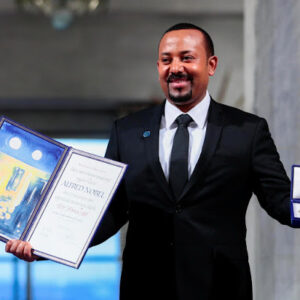 The Norwegian Nobel Committee’s pick for the 2019 Nobel Peace Prize was also a controversial choice. Abiy Ahmed Ali is on course to be an embarrassment to the Nobel Peace awarding Committee and a huge disappointment to the global peace movement. Just months after receiving the Nobel Peace Prize in Oslo, Prime Minister Ahmed signed a pact with the demons that have violently convulsed Ethiopia for decades and ruined the legacy of his predecessors: illusions of power and grandeur, the bane of Ethiopia’s political class.
In addition to being the youngest and most inexperienced leader in Ethiopian history, PM Ahmed seems to be profoundly insecure and delusion-prone. These dangerous dispositions can easily lead to gross miscalculations and catastrophic errors of judgement. Such a character is not only a threat to his country as is evident in the tragic events currently unfolding in the Oromia Region. He is also a menace to the peace and stability of neighboring countries and even the entire Horn of Africa region. In December 2018 the Special Representative of the Secretary-General for Somalia and Head of the United Nations Assistance Mission in Somalia, Mr. Nicholas Haysom, expressed concern and questioned the legality of Ethiopian troops’ illegal and violent intervention in Southern Somalia. Seven months later, the Commander-in-Chief of the Ethiopian Defense Forces dispatched planes carrying special operations commando units from the Eastern Command based in Harar to the coastal city of Kismayo to overthrow the Jubaland State Government with a view to rigging the planned elections there. And shortly after he was declared the winner of the 2019 Nobel Peace, the Ethiopian Prime Minister was accused by the UN of destabilizing the fragile states of Somalia and South Sudan. The 2019 Nobel Peace Laureate is not a man of peace.
No one expects the gray minds and majestic contemplations of the lords of global peace to be flawless and perfect. That is asking too much. However, members of the Norwegian Nobel Committee and the Norwegian Parliament which appointments them must devise a mechanism to recall a Nobel Peace Prize when it is awarded wrongly to the wrong individual. Unfortunately, members of the NNC seem unable or unwilling to reconsider or rethink their verdict once they delivered it. The current Chair of the NNC, Berit Reiss-Andersen, ruled out any scenario in which the prize could be revoked. “We don’t do it. It’s not our task to oversee or censor what a laureate does after the prize has been won,” she said. “The prizewinners themselves have to safeguard their own reputations.” She made this remarks in the context of a global petition to strip Aung San Suu Kyi of the 1991 Nobel Peace Prize. She most probably holds the same view about and expects the same from the 2019 Nobel Peace Laureate. To err is human. Many, including myself, initially fell for Abiy Ahmed’s fairy tale story beneath which lurked a Janus-faced tyrant. However, to insist on not rectifying a mistake or a tragic error of judgement, especially one that turns out to be heavily consequential, is NOT. Members of the Norwegian Nobel Committee can muse leisurely in their iconic and hermetically sealed enclave not far from the North Pole. But the millions whose lives and hopes have been recklessly ruined by tyrants crowned as Nobel Peace Laureates must continue fighting for justice even if it is delayed. Struggles for justice and human dignity may be hard and long. And the temptation to give up or give in quite strong, often irresistible. But occasionally they bear fruit in the most mysterious ways imaginable. Imagine the ghost of Alfred Nobel visiting members of the Norwegian Nobel Committee in a dream on 10 December 2020 and revealing to them an amendment to his Will secretly locked in the basement of a law firm in San Remo, Italy. Imagine the dream coming true, and after protracted, ferocious and costly legal battles confirmation that the amendment was authentic. And in it, Alfred Nobel spells out protocols for revoking Nobel Prizes awarded to individuals who do not qualify and do not deserve. It could happen. Believe me. Miracles could happen in the land of midnight sun. keynanhassan@yahoo.com |

